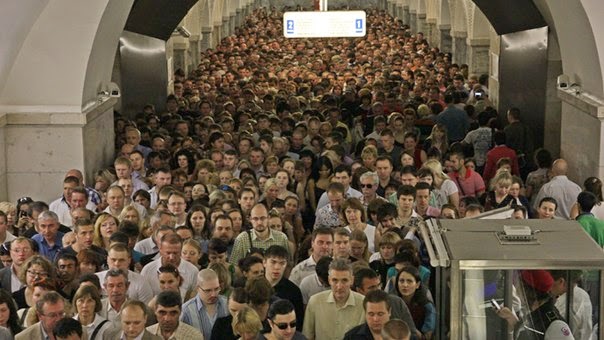Moscow’s Life 7 Biggest Problems And 7 Solutions
https://www.learningtoknowrussian.com/2015/04/life-moscow-problems-solutions.html
Living in Moscow is never easy, especially if you’re from a small city or town.
The interesting part, though, is that everyone has a different reaction to the city. Some people fall in love with it immediately, while others never get comfortable with the non-stop hustle and noise of the city. Some of my friends have been in Moscow for 10 years and still hate it!
As for me, it’s a long time since I felt like an outsider in Moscow. I adjusted very quickly and love living in the city.
At the same time, there are a lot of inconveniences. It doesn't matter how much money you have, what you do or where you’re from, you can’t escape them. Some of these problems are unique to Moscow and Russia, while others are things you’d encounter in any big city.
But I’m not just going to list off all of Moscow’s problems. I’ve also got solutions.
1. Crowds and noise
Let’s be honest. There are way too many people in Moscow, somewhere between 11 million and 20 million, depending on who you talk to. The streets are always crowded and it’s even worse in the Metro. It can be kind of scary and overwhelming at times.
 |
| Park Kultury subway station, Moscow (photo: vk.com) |
No matter the time of day or night, you’ll find stores, movie theaters, clubs, restaurants, cafes and plenty more open for business. That’s a big advantage. Instead of complaining about the crowds, think about all the conveniences, like 24/7 shopping and dining out.
Look for word круглосуточно [kroo-gloh-soo-toch-noh] (means: day and night, 24/7) on signboards.
Look for word круглосуточно [kroo-gloh-soo-toch-noh] (means: day and night, 24/7) on signboards.
2. Viruses
There are lots of ways to get sick in Moscow. The cold climate, air pollution and cramped public transportation leave you exposed to viruses and infection every day.
So do Muscovites run to the doctor the second they feel a cold coming on? No way. Most people go to the nearest аптека. You’ll find an аптека on almost every street corner and they all have a sign out front with the word Аптека [up-teh-kah] in big, bold colors. You’ll be amazed at how easy it is to get what you need. Just describe your symptoms to the pharmacist and she’ll tell you exactly what to buy. You don’t need a prescription. In fact, you can even buy antibiotics over the counter.
3. Long distances
Being sick never feels nice. Imagine asking for help in this state while being in a foreign country…You would need to strain your memory while struggling to remember any Russian words or phrases. Speaking a foreign language alone is stressful enough, add to this a state of being sick and you’ll find yourself completely frustrated. But what if you could speak Russian without stress, automatically and effortlessly? I’m not suggesting you to buy some super awesome course that will make you learn Russian in 7 days. In fact, I’m not suggesting you to buy anything at all :) I simply want to show you a few effective learning techniques that will help you overcome your language barrier. So, just let me know if you’re interested in joining the effective language learners community ;)
It always takes a long time to get around in a big city and Moscow is no exception. It’s hard to get anywhere in less than 30 minutes here. Everything takes longer: getting to the metro, riding the escalator to the bottom, finding your destination. It can be very exhausting.
 |
| Speedy "маршрутка" on Russian roads (photo: pinterest.com) |
But there is one practical, if slightly terrifying solution. Like every Russian city, Moscow has thousands of convenient маршрутка [marsh-root-kah] - taxi vans that run the same routes as buses, but pick up and drop off anywhere on the route. The drivers are financially invested in getting you to your destination as quickly as possible, even if that means driving at breakneck speeds through Moscow traffic. Just pay the driver when you get on and yell “Остановите!” [os-tah-noh-vee-teh] when you want to get off.
What do you tell a taxi driver, how do you use one of Russia’s minivan taxis and how far does a “one-ride” ticket in the metro take you? Find these great tips in our article Navigating In Russian Cities. We’ll make sure you never get lost in Russia!
4. Long-long, cold-cold winter
If you’re someone who loves warm weather, I can only sympathize. The winter in Moscow is very long. It usually starts in October and lasts until late April. During the winter months, you only get 7 hours of sunlight (9 am - 4 pm). And the temperature drops far-far below zero.
 |
| People waiting for a bus on a cold snowy day in Russia (photo: pinterest.com) |
Russians cope by turning the coldest, darkest months of winter into an extended holiday. Once winter arrives, the city begins preparing for the upcoming holidays. Notice the plural. Yep, Russians need more than one holiday to survive the winter.
 |
| New Year fair in Moscow, Red Square |
5. Environmental pollution
I already mentioned the pollution. Not surprisingly, Moscow has millions of cars and factories spewing out toxic fumes every day.
 |
| Family is "hanging out" on a "дача" |
Just watch out for the traffic jams, which are especially notorious on Friday nights when it seems like the whole city is trying to escape to the countryside.
 |
| Yandex.Probki app showing traffic status in Moscow |
7. Busy, non-smiling people
 |
| (photo: pinterest.com) |
While you will see a lot of scowls, the good news is that people are at least very honest. No one stops to waste time on silly pleasantries. If someone doesn’t want to help, they’ll just keep walking. But when someone does stop to answer your question, expect a genuine улыбка [oo-lyb-kah] and sincere effort to help out, even if they don’t know the answer.
If you do want to try out your luck with approaching “busy people of the capital”, you might want to consider being at least a bit prepared for it, i.e. in case you don’t want to be shoved away on the spot, you might need a few handy phrases to start off a conversation and grab local’s attention by saying something in Russian. But you should also be ready for a rather fast and at some point harsh answer. The good news is that there’s a way to be prepared for such situations. And I can show you how.
***********************************
Moscow is an amazing place: no matter what your experience, it’s unlike any other city in the world.
I miss you, Moscow! :)
If you’ve already been to Moscow, I’d love to know what you thought of the city.
Even if you haven’t visited, but have heard a lot about it, feel free to comment as well.
If you’ve already been to Moscow, I’d love to know what you thought of the city.
Even if you haven’t visited, but have heard a lot about it, feel free to comment as well.
Best regards, Denis Ivanov
Co-Founder, Learning To Know
Join us: facebook.com/LearningToKnow

.png)







